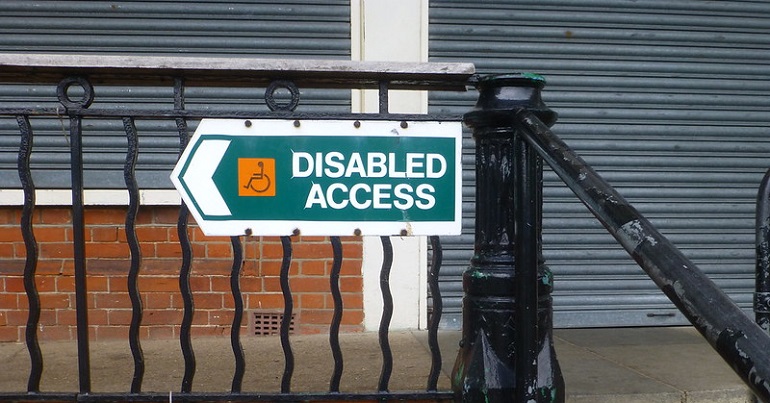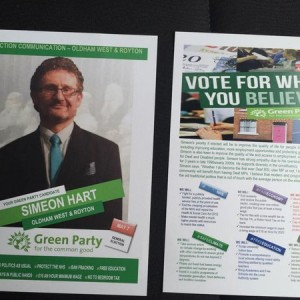Why accessibility is so important

Disabled Access Day, so says Founder Paul Ralph, is a chance to “celebrate accessibility and a chance to try something new”. This day is also a timely reminder for all businesses and venues to stop and ask themselves whether they are accessible and inclusive. Even though the Equality Act was passed 10 years ago, many places still don’t have it quite right.
Having grown-up as the only child of a parent who was a Polio survivor, I realised at an early age that places are not designed well for disabled people.
Polio had left my late mum partially paralysed. She walked with difficulty. Accessibility issues greeted us everywhere we went: stairs without handrails, chairs without arms for grabbing onto, public spaces without seats, floors with slippery surfaces, poorly maintained pavements where she frequently tripped. A potential accident was always waiting to happen.
Public transport was particularly difficult. When my Mum was obviously struggling up the aisle of a bus, few offered their seat up to her. In more recent years, she became a wheelchair user. In the 80s buses were not accessible to wheelchairs at all. She was often forced to pay for taxis. I realised at an early age, that it was incredibly hard to be disabled in this world – or, more accurately, some people are disabled by this world.
Why accessibility is important
My own personal experience has made accessibility very important to me. I will often speak out in public places if I encounter poor practice. Some years ago, I was in a restaurant when I noticed a table and chairs placed right in front of the accessible toilet. There was no way a wheelchair user would have been able to manoeuvre around it. I challenged the manager, who apologised and promptly moved the furniture. We should not let these things go.
The responsibility is upon all of us. And particularly on the public places, spaces and services that should be equally accessible to all. Pubs, nightclubs, theatres, cinemas, cafes, railway stations… Do they have ramps? Do they have space for wheelchairs to turn around? Do they have an accessible toilet that is equipped properly, and hasn’t been used as a store room for toilet rolls, brooms etc? And do they make their venue easy to access for those with other disabilities, including the hidden disabilities? Does the equipment they have installed work properly – hearing loops for example? Is it regularly maintained?
When I was trying to navigate public spaces with my late mum, we often didn’t know how accessible a place would be until we got there. Fortunately nowadays, we have the internet. In Sussex the ‘It’s Local Actually’ website contains information about accessible venues. All businesses should aim to appear on there, showing how welcoming and inclusive they are.
The part we can play
It’s not always easy, depending on the nature of the building or the space but there are often things that can be done. At the Council’s recent Tourism, Equality, Culture and Community (TECC) Committee, we recently discussed beach accessibility. The Council has been working on this for years. This is a difficult accessibility issue to resolve because of the pebbles, shifting terrain and the cost. But work is in progress. The Council is working with disabled people and charities towards solutions. Everyone has the right to access the beach.
As Paul Ralph, of Disabled Access Day, said “We understand that not everywhere is fully accessible, but if they are honest about what is/is not available, then people can plan accordingly.”
With our current challenges of coronavirus and climate change – supporting people left vulnerable will be more important than ever. People with disabilities often rely on care and also on carers – provisions of food and daily activities too that are important for mental health.
This isn’t just about the physical access for people with disabilities to our city and society, this is also about their social separation and some of the poisonous stigma they face. So I was delighted that we could play a part in reversing some of this through the city council’s budget when we were able to reverse some of the cuts to disability services and support the city’s only Advice Centre for people with disabilities – run by Possability People – after cuts to this service were made in previous years. Further in recognition of cuts made to short breaks for carers year on year, our amendments will return extra funding to this service.
I remember I was told once “The restaurant is on the first floor. I suppose we could put your Mum in the goods lift?” Of course we left and went elsewhere. Disabled people face these barriers daily when they step out of their homes, go to work, or go about their daily lives. I know this can lead some people to just not want to go out at all.
Attitudes and language towards disabled people thankfully are changing. But Disabled Access Day shows us that despite equality legislation, many places still haven’t got things right. We all need to ask ourselves: are we doing our best to make sure we are accessible and inclusive for everyone?
Image credit: citytransportinfo – Creative Commons



Another important consideration for organizations is that Web accessibility is required by laws and policies in some cases. WAI Web Accessibility Policy Resources links to resources for addressing legal and policy factors within organizations, including a list of relevant laws and policies around the world .